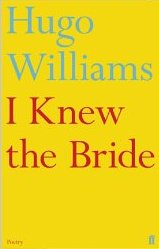Last week, the Poetry Book Society in the U.K. announced the winner of the 2014 T.S. Eliot Prize, given to an original work published in English in Ireland and the United Kingdom. It’s Britain’s most prestigious poetry award; this year, winning the prize meant 20, 000 pounds (about $35, 000); the 10 shortlisted poets got 1, 500 pounds. The T.S. Eliot Estate has become the sole sponsor of the prize.
This year’s winner was David Harsent for Fire Songs; this is also the fifth year Harsent has made the short list. The competition was strong; seven of the nominees had been shortlisted for the prize before, and three of them had actually won it. One of the three previous winners was Hugo Williams; he was nominated for the 2014 prize for I Knew the Bride, his eleventh collection of poetry.

The poems in the collection are roughly divided into those that look backward and those that focus on the immediate. They are at once beautiful and provocative; 18 of the poems are grouped together as “From the Dialysis Ward.” Poets have written about dealing serious illness, but I’ve rarely seen the jagged beauty I find in these 18.
This is the poetry of pain, sharp pain, sometimes met with despair and sometimes with humor, but always with the determination to get through it. Williams is suffering from kidney disease, and has been on another kind of list – a list for a transplant. That’s why, perhaps, the dialysis poems also convey a sense of urgency. (He was unable to attend the prize ceremony because he was recovering from the operation.)
If I’m Early
Every other day I follow the route
of the Midland Railway
to where it cuts through
St. Pancras Old Church Cemetery.
I might go into the church
and heave a sigh or two
before continuing via a gate
set in the cemetery wall
to the Mary Rankin Wing
of St. Pancras Hospital.
As a young man, Thomas Hardy
supervised the removal of bodies
from part of the cemetery
to make way for the trains.
He placed the headstones
round an ash tree sapling,
now grown tall, where I stop sometimes
to look at the stones
crowding around the old tree
like children listening to a story.

The title poem, “I Knew the Bride, ” is about his younger sister, Polly, who died from cancer in 2004. It’s a longish poem, and makes much about the idea of hair; he’s taking on his sister’s journey from childhood to death and he punctuates it with references to her hair, including the loss of it at the end of her life. But it finishes with an image that takes your breath away. Here, the actor and singer Jeremy Clyde (one half of the 1960s singing duo Chad & Jeremy and a friend of Williams since early childhood) reads both this poem and one of the dialysis poems at the T.S. Eliot Prize ceremony (the reading of the poem starts at about the 3:00 mark).
The heart cries out at this, and indeed at all of the poems in this collection.
Photo by Simon & His Camera, Creative Commons, via Flickr. Post by Glynn Young, author of the novels Dancing Priest and A Light Shining, and Poetry at Work.
Want to brighten your morning coffee?
Subscribe to Every Day Poems and find some beauty in your inbox.
- Poets and Poems: Andrew Calis and “Which Seeds Will Grow?” - December 19, 2024
- Holiday Gifts for the Poet in Your Life (or the Poet in You) - December 17, 2024
- Poets and Poems: Gillian Allnutt and “wake” - December 12, 2024

Bethany Rohde says
Thank you for writing this post and sharing Williams’s poem, “If I’m Early.” Wow, that image of the headstones around the ash tree is just devastating. What an incredible use of language.
Glynn says
Bethany, many of the poems in this collection have that type of startling, remarkable image. Thanks for the comment!
Sandra Wirfel says
This poem “If I’m Early” was chilling. I can’t imagine what it would have been like to remove bodies from a graveyard all in the name of progress for trains to come through.
Is there a challenge? What are you looking for us followers to share? Because my creative edge is just waiting for your challenge…
Glynn says
Removing bodies from a graveyard to make way for “progress” has happened in many places. In my own town, a cemetery had to be relocated to accommodate the building of an interstate highway. Thanks so much for reading and commenting!
Marcy Terwilliger says
Glynn,
So you feel beauty can be found in the ones who write a poem about their diseases? Maybe a poem about their time is running out? There are those who can relate, yet many who are far removed. Yet, he wins a prize for this type of poetry.
If you can believe the removing bodies from a graveyard to make way for “progress.” They did this at the Nashville Zoo in order to add a fake animal display. Servants from the 1800’s. You always get my attention with the great articles you write and share with us.
Glynn says
Marcy, actually, while his poems were a finalist, he didn’t win the Eliot Prize for this volume but for one he published back in 1999 (and which wasn’t about disease). A fairly considerable number of poets and writers have written about disease – I think the writing is a way for people to come to terms with it, particularly when it’s terminal or potentially terminal.
Thanks for reading and commenting.
Marcy Terwilliger says
Thank you Glynn, it was a bit late for reading but now I see it so clearly. I listened to the poem reading “I Knew the Bride.” Oh, that was a beautiful, real, the poem, I even got a smile about the cowboy hat sailing ahead. The dark shadows are the cancer, she carried and hide it well. Cancer has no respect on persons.
Marcy Terwilliger says
It’s just a shadow
Maybe a fold in the skin
Come back in six weeks
We’ll take another X-Ray then.
You ponder, you wait,
It’s in the back of your mind
You mark down the date
The day, the weeks,
Time pasts by.
Sandra Wirfel says
Marcy,
Well put, you capture the anxiety of waiting well.
Sandra Wirfel says
A Life of Pain
Allergies
Broken Thumb
Broken pinky
Childbirth x 5
Depression
Hysterectomy
Migraines
Osteoarthritic knees
Rheumatoid Arthritic fingers
Severe Dysplasia
With each
Experience of pain,
I am grateful
To be alive.
Y14M9D28 SLW
This is the closest I get to writing about pain or medical ailments.
Marcy Terwilliger says
Sandra,
Thanks for the comment about my little poem. I enjoyed yours as well, it is good to be alive even though we all experience pain as well.